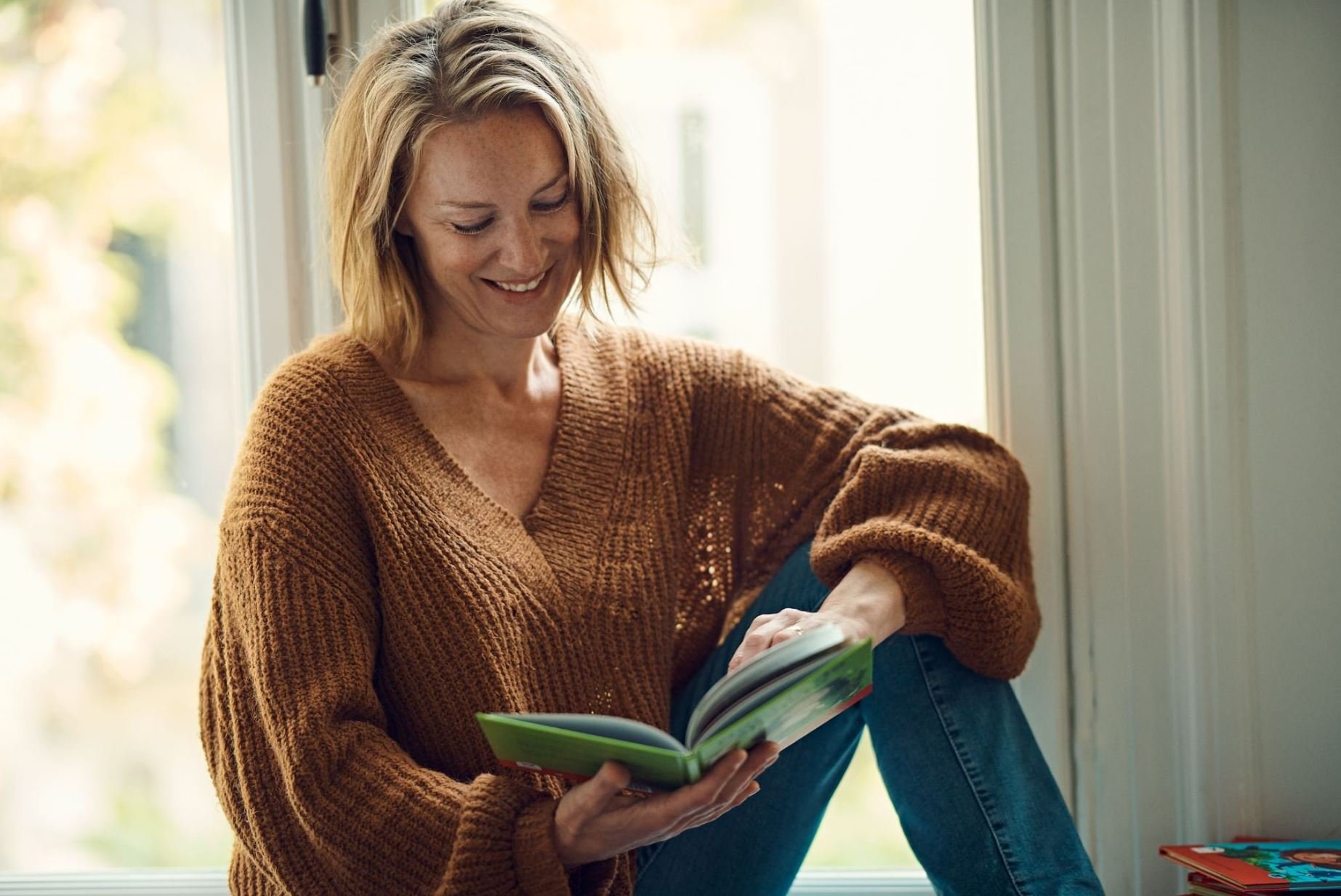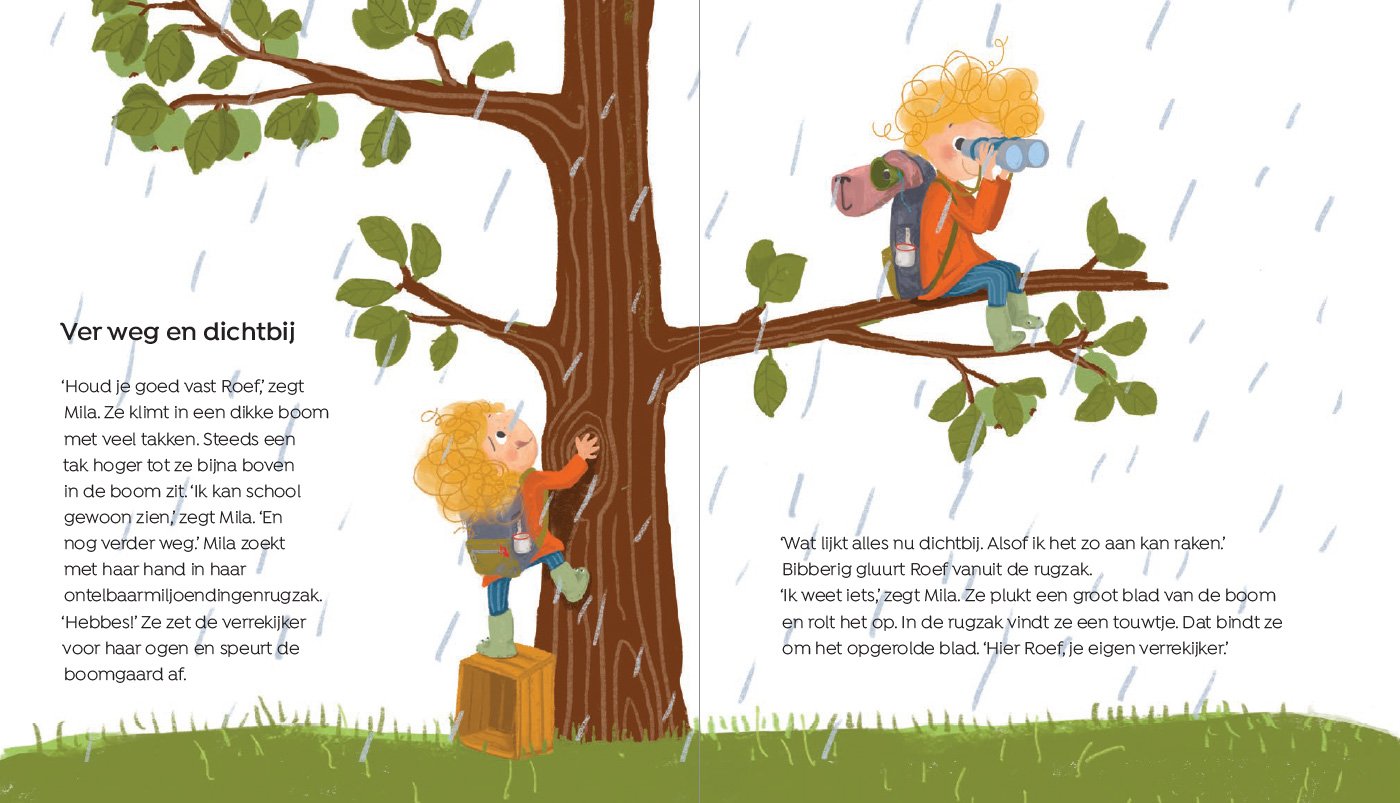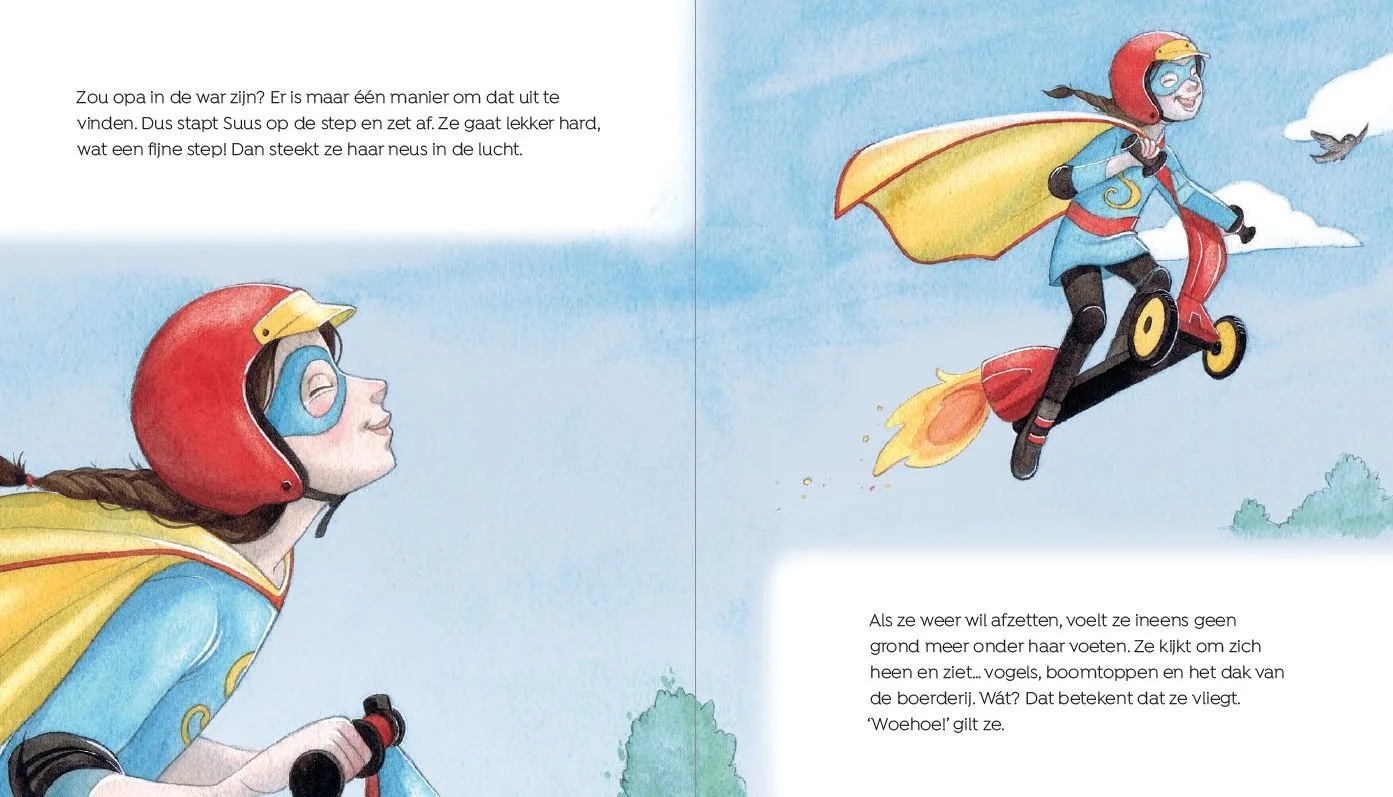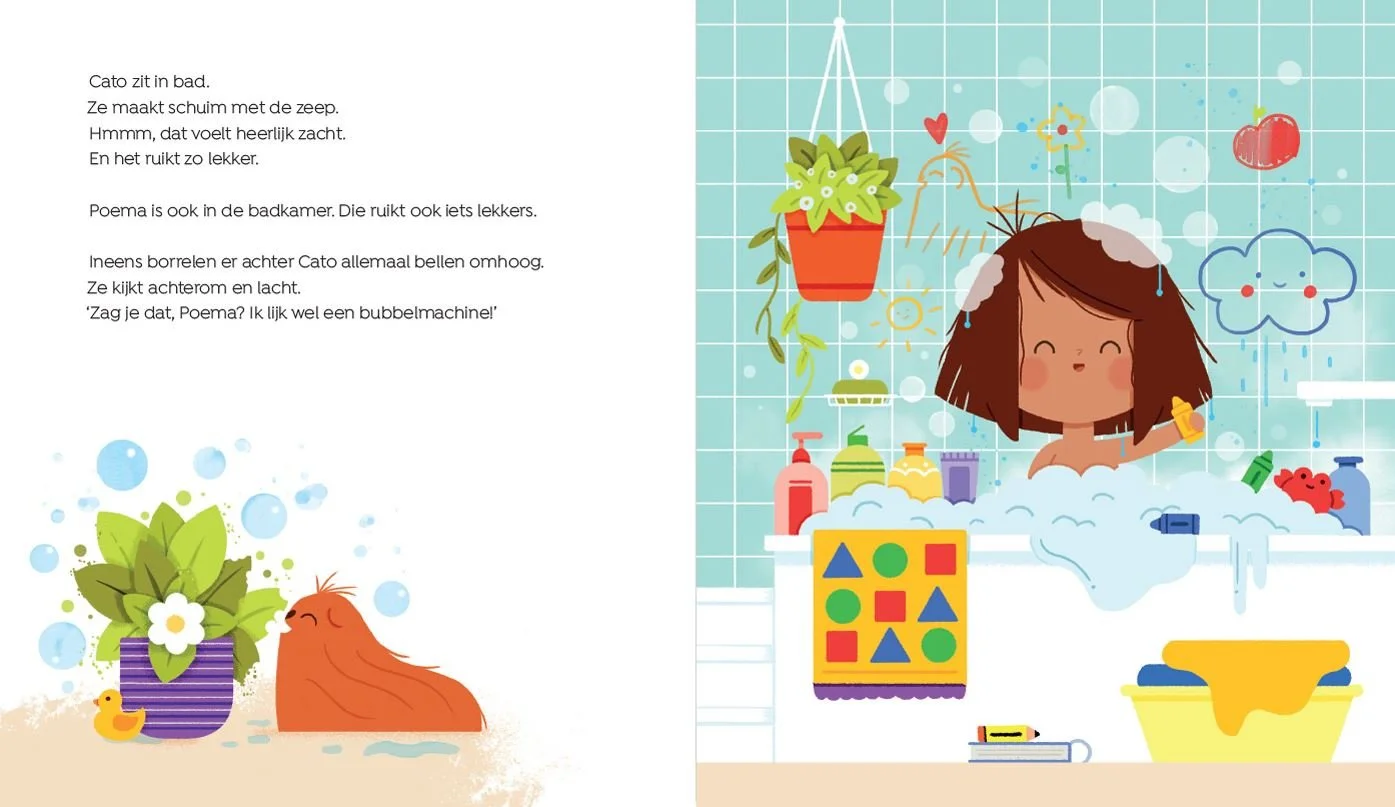Malou Cornet: I dream that the world no longer needs our books
Malou (48) ★ lives in Amsterdam, Netherlands -> founder of publishing house Mo’s Daughters -> publishes beautifully illustrated books where girls are playing the main role free from stereotypes ✗ she loves cooking, travelling and reading
Malou, what was the impulse which led you to start publishing books with girls as role models?
After having worked in corporate jobs for twenty years, we (my husband and me) quit our jobs and travelled the world with our two kids for a year and a half. As our kids were two and three years old at the time, we brought a lot of children’s books with us to read to them. While reading these, I realized that I was changing the lead characters into girls half of the time – switching the role of the moms and dads in the stories. The books were filled with stereotypes, especially when it came to girls. Girls were hardly ever the lead character, and more than often than not, they were ‘princesses that needed rescuing’ or were ‘afraid’. I realized that girls, also my daughter, would not recognize themselves in most of the ‘heroines’ in children’s books. She wasn’t represented.
Coming home from our travels, I had the contours of Mo’s Daughters in my head. I did quite a lot of research and found out that only around 20% of the children’s books (0-6 years old) have a girl in the lead character. And, in exactly those early years, kids shape how they see the world and what it means to be a boy or girl. I learned how important parents, school and the media are in shaping this vision. I learned that by the time kids are seven years old they already believe that intelligence is a character trait that belongs to boys and not so much to girls. Which is not true at all, but stereotypes and stereotypical behavior towards kids are at the basis of this belief.
I decided that my mission would be to change the narrative we tell to and about girls. I want them to know they can be anything they want to be, and that nobody should tell them otherwise just because they are girls. I believe in role modeling and decided that especially for young girls (but really all children) you need to give them identifiable, inspirational female role models in books. I wanted to show them adventurous, smart, inquisitive, funny and positive girls that are leads in stories stripped from all stereotypes. These stereotypes are just so limiting and damaging.
“I decided that my mission would be to change the narrative we tell to and about girls... I wanted to show them adventurous, smart, inquisitive, funny and positive girls that are leads in stories stripped from all stereotypes. These stereotypes are just so limiting and damaging.”
How can we imagine the heroines of your books? What are they like?
We would like for every child to see itself represented in children’s books. That’s why Mo’s Daughters now has seven heroines – all very different in character, appearance and interests. But they are all independent, funny, adventurous and passionate. We want to spark interests in adventure, sports, science, computer coding in a very playful way. There’s Maan, who travels the world; Cato, the little scientist; Mila, the adventurer; Noor, who excels in sports; Pixie, who loves computers and coding; Suus, the superhero; and last but not least is Wies, a very inquisitive toddler that never stops asking ‘why’ until you give her an answer that is satisfying. All of the heroines have been created by a diverse, international group of talented illustrators and writers that are just a blessing to work with.
Books – words and images – form our view of the world. What kind of world do little girls discover in your stories?
You can be anything you want and don’t let anybody tell you otherwise. Go out and discover the world around you. It’s OK to make mistakes because that’s how you learn. Believe in yourself, you are exactly right just as you are. Girls will discover an adventurous wonderful world where they are the main character. This should be normal as 50% of the population is female. A character that they can recognize themselves in in a positive way, that inspires instead of limits them.
“You can be anything you want and don’t let anybody tell you otherwise. Go out and discover the world around you. It’s OK to make mistakes because that’s how you learn. Believe in yourself, you are exactly right just as you are.”
With this example, you break the stereotype of what family life should look like according to some other books. What other stereotypes do your books touch?
We focus a lot on removing stereotypical behavior and words. We make sure that our stories and illustrations are stereotype-free. Moms work and dads participate in the household, as it is in the normal world – while in children’s book a meager 13% of the moms work. Our girls do not need to be rescued, they are not afraid of irrelevant things, they do not fight amongst each other, they excel in what they do and they are vocal and smart. We do not use words that make girls smaller. We have what we call ‘Mo’s Rules’ in which we have specified exactly how we work and how not to.
All of the books are beautifully illustrated! At first glance, you can feel the body positivity in the pictures – people there are not ridiculously shaped – is that intentional?
Yes, very much so! Our girls look like little girls, not little women. We want kids to read our books and see themselves. Also, we make a point of not spending any words on appearance unless it is absolutely necessary for the story, which by the way, is hardly ever.
Why do you think reading with young children is important?
Reading and being read to expands your universe and it tickles your imagination. Stories show you a world that you can still explore and discover as a child. And it’s not only fun. Research has shown that children that are regularly read to from an early age have a larger vocabulary as it develops their language and listening skills. As a parent reading with your kids, selecting which books and which stories to read not only gives you the opportunity to snuggle up, but also to teach your child valuable life lessons in a relaxed and intimate setting.
“Reading and being read to expands your universe and it tickles your imagination. Stories show you a world that you can still explore and discover as a child.”
What does the creative process of making a book look like?
Making the book is a collaborative creative process. We have brainstorming sessions, gave our girls a name and character, authors give feedback on illustrations and illustrators on the text. Coming from a corporate background, I do believe that it needs to be a streamlined process to make sure we don’t waist anybody’s time on unnecessary work. So, I have (flexible) formats for the books and a process in place on what to deliver when. But now most of the characters already have three books to their names, so the creative teams ‘just know her.’
Do you plan to have the books translated into English or any other languages?
Yes, most of the books have been translated into English, but haven’t been published yet. We are in collaboration with a large retailer and four of our titles were sold in France and Belgium. It is our mission to reach as many households as possible, so going abroad is definitely on the agenda and not only to English speaking countries!
Which childhood adventures do you remember the most?
There are many, but one I am very fond of is when I was seven or eight. We decided with a group of friends from school that we would make a circus show in my parent’s barn. We spent an afternoon making posters and distributed them in the tiny village where we lived. We practiced our show for a week or so, we created some sort of arena for the audience and decided our entry fee would be 10 cents. All the proceeds would go to our school library. As I remember it, it was a huge success – loud applause – and ‘all of the money’ we made was donated to buy one book that was presented in an official moment with the principal of our school.
“My dad always taught me that doing your job really well means you make yourself obsolete, not necessary.”
What are your dreams for the future?
For Mo’s Daughters to be a movement, to change the way we talk about and to girls by expanding internationally and into other media. I would love to reach the millions and millions of children and girls worldwide and especially also those that do not have access to books and/or a wide variety of female role models. My dad always taught me that doing your job really well means you make yourself obsolete, not necessary. The same goes for Mo’s Daughters. In the end, my dream is that what we do, what we want to achieve, is not necessary any more.







